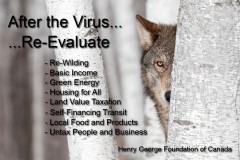In preparation for future challenges like COVID-19, we should take steps to address the root causes of low societal resilience. An important such step is a move to Land Value Taxation. This financial modification would turn the tax structure into a policy tool to boost community resilience without additional taxation or micromanaging legislation.
Land Value Taxation
LVT is a levy on the privilege of owning land. Fees are applied equally to vacant and productive land (ignoring buildings), which encourages owners to use their land efficiently or sell it to someone who will or leave it to nature. LVT eliminates speculation since rises in land value are captured by the community, they do not flow to the owner. Land taxes cannot be evaded eliminating offshore tax havens, the underground economy and tax cheating.
Re-Wilding
More and more people think half the Earth must be left to nature. If governments collect the rental value of land in lieu of taxes on jobs, business and sales, landowners will be forced to use their land to its highest and best use or sell it, thus reducing sprawl and allowing underused land to be returned to nature.
Self-Financing Infrastructure
Under LVT, infrastructure, like transit, schools, parks, roads, become self-financing since capturing the rise in land value from publicly-funded construction projects is used to finance the projects. Warranted infrastructure consistently returns more than its cost in the form of local land value rise.
Basic Income
Developed countries already have extensive social safety nets amounting to a Basic Income in all but name. To turn the present situation into a basic income requires the simple step of combining existing social payments into one, plus including the working poor. A UBI is only a good idea if it's funded out of rent, otherwise it will mostly be a subsidy to landlords and other landowners.
Housing for All
Under LVT, landlords are motivated to renovate and upgrade the housing stock because there are no taxes on materials or labour, nor will taxes increase upon completion. LVT is levied only against the lot, not the buildings. Rental accommodation becomes inexpensive in multi-unit buildings since these buildings are sited on small lots and the landlord pays no tax on the value of the building. Importantly, LVT can not be passed on to the tenants.
Untax People and Business
Taxing incomes makes people more expensive to hire, taxing capital increases the cost of borrowing, taxing profits pushes marginal enterprises closer to bankruptcy, and taxing consumption raises prices. Economists refer to these taxes as dead weight taxes since they stifle economic vitality and exacerbate unemployment and poverty. Alternatively, funding government programs by capturing the community-generated, "unearned income" (that accrues to desirable finite assets) increases economic efficiency, reduces poverty and unemployment, checks suburban sprawl, conserves resources and minimizes pollution.
Green Energy
Carbon fee and dividend systems are the best way to reduce CO2 emissions. Carbon fees remove some of the super profits from the fossil energy industry, giving renewables and conservation closer to the level playing field they deserve. Green energy needs the assistance of rent recovery, since renewables and conservation don’t attract rent and thus can’t generate profits above the cost of production, which means they don’t attract equivalent investments.
Local Food and Products
Carbon fees would increase global fossil fuel-based transportation costs thus encouraging local production. Land rental value capture ignores buildings, which would lower the cost of local manufacturing. LVT would bias towards labour-intensive (by untaxing jobs), structure-intensive, value-added manufacturing and farming. Collecting the rental value of land (and ignoring improvements) would raise the carrying cost of land but lower the upfront cost, so bank loans to finance land purchases would no longer be required, elimination interest payments for the land component of farming and manufacturing.

